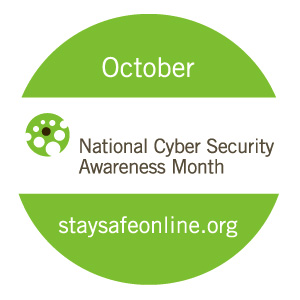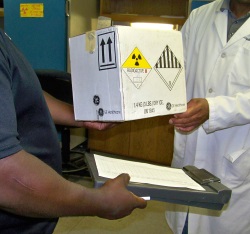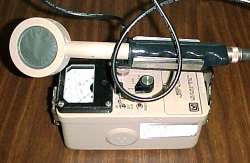Stop. Think. Connect.
Published Date: Oct 17
 Cyberspace is a shared resource, and its security is the responsibility of all American citizens, businesses, groups and governmental agencies. Cyber security begins with the awareness of our individual internet usage habits and changing them to practices that can help safeguard our digital lives.
Cyberspace is a shared resource, and its security is the responsibility of all American citizens, businesses, groups and governmental agencies. Cyber security begins with the awareness of our individual internet usage habits and changing them to practices that can help safeguard our digital lives.
Remember to:
STOP. THINK. CONNECT.
STOP: Before you use the Internet, take time to understand the risks and learn how to spot potential problems.
THINK: Take a moment to be certain the path ahead is clear. Watch for warning signs and consider how your actions online could impact your safety, or your family's.
CONNECT: Enjoy the Internet with greater confidence, knowing you've taken the right steps to safeguard yourself and your computer.
Read more...

Remember to:
STOP. THINK. CONNECT.
STOP: Before you use the Internet, take time to understand the risks and learn how to spot potential problems.
THINK: Take a moment to be certain the path ahead is clear. Watch for warning signs and consider how your actions online could impact your safety, or your family's.
CONNECT: Enjoy the Internet with greater confidence, knowing you've taken the right steps to safeguard yourself and your computer.
Read more...
Radioactive Material Inventory
Published Date: Sep 24
 UAB has a very accurate and sophisticated inventory system that enables the EH&S Radiation Safety program (EH&S) to track all radioactive materials within the possession of authorized UAB personnel (physicians, professors, students, researchers, etc.).
UAB has a very accurate and sophisticated inventory system that enables the EH&S Radiation Safety program (EH&S) to track all radioactive materials within the possession of authorized UAB personnel (physicians, professors, students, researchers, etc.).
The inventory system enables EH&S to track every stock material from the moment it arrives at UAB until its disposal. The system is important because it reduces the loss of radioactive material and enables UAB to remain in compliance with ADPH and USNRC regulations.
To ensure the system is working as designed, EH&S continually monitors inventory submissions and regularly audits users.
EH&S Radioactive Material Inventory
 UAB has a very accurate and sophisticated inventory system that enables the EH&S Radiation Safety program (EH&S) to track all radioactive materials within the possession of authorized UAB personnel (physicians, professors, students, researchers, etc.).
UAB has a very accurate and sophisticated inventory system that enables the EH&S Radiation Safety program (EH&S) to track all radioactive materials within the possession of authorized UAB personnel (physicians, professors, students, researchers, etc.).The inventory system enables EH&S to track every stock material from the moment it arrives at UAB until its disposal. The system is important because it reduces the loss of radioactive material and enables UAB to remain in compliance with ADPH and USNRC regulations.
To ensure the system is working as designed, EH&S continually monitors inventory submissions and regularly audits users.
EH&S Radioactive Material Inventory
Radiological Survey Instrument Calibration
Published Date: Sep 19
What is calibration and why is it needed?
 Calibration is the process by which a quantitative measuring instrument is manipulated to respond and indicate a certain range of acceptable values. Accurate instrument calibration and its proper use is fundamental in a clinical or research laboratory program. Proper calibration ensures that meters can accurately detect radiation. It is also important to understand what is being calibrated and how the calibration is being performed. In this article, we will be discussing calibration of radioactive detecting instruments.
Calibration is the process by which a quantitative measuring instrument is manipulated to respond and indicate a certain range of acceptable values. Accurate instrument calibration and its proper use is fundamental in a clinical or research laboratory program. Proper calibration ensures that meters can accurately detect radiation. It is also important to understand what is being calibrated and how the calibration is being performed. In this article, we will be discussing calibration of radioactive detecting instruments.
Read more
 Calibration is the process by which a quantitative measuring instrument is manipulated to respond and indicate a certain range of acceptable values. Accurate instrument calibration and its proper use is fundamental in a clinical or research laboratory program. Proper calibration ensures that meters can accurately detect radiation. It is also important to understand what is being calibrated and how the calibration is being performed. In this article, we will be discussing calibration of radioactive detecting instruments.
Calibration is the process by which a quantitative measuring instrument is manipulated to respond and indicate a certain range of acceptable values. Accurate instrument calibration and its proper use is fundamental in a clinical or research laboratory program. Proper calibration ensures that meters can accurately detect radiation. It is also important to understand what is being calibrated and how the calibration is being performed. In this article, we will be discussing calibration of radioactive detecting instruments.Read more
